#The City of God
Explore tagged Tumblr posts
Text

Saint Augustine writing "The City of God" in the early 5th century
#saint augustine#augustine of hippo#the city of god#5th century#christianity#illustration#drawing#digital art#artworks#my art#artists on tumblr#ai generated
9 notes
·
View notes
Text

5 notes
·
View notes
Text
Early Christians had a complete Bible by the 4th century.
But that’s not the only thing they were reading to deepen their faith.
In the early Church, there were a lot of great books being passed around.🧵
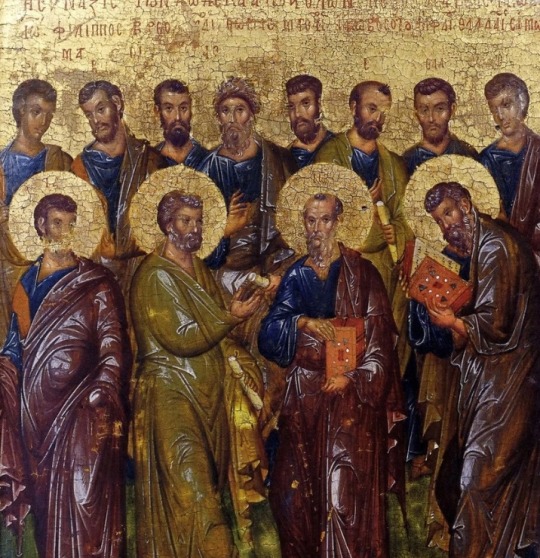
The Didache, Anonymous, 1st century
The Didache is a brief discourse that contains moral and ritualistic teachings — a handbook for a Christian life.
It’s speculated the apostles wrote it, and contains the formulas for baptism and eucharist that are still used today.
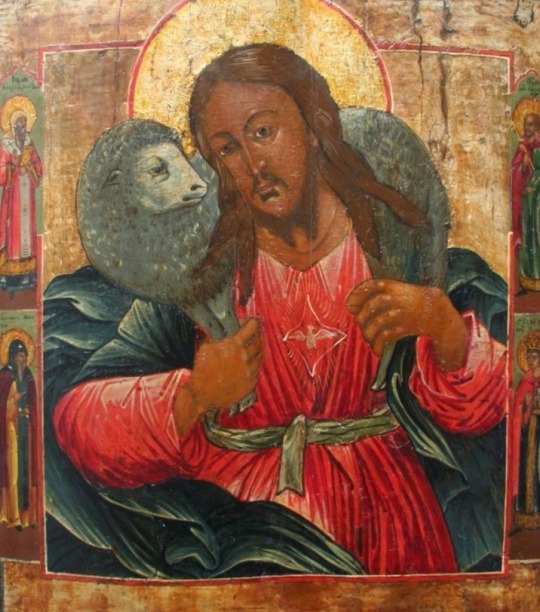
The Shepherd of Hermas, Hermas, 2nd century
St. Iranaeus considered it to be canonical scripture.
Though it missed the cut, it’s a fascinating work that centers around the life of a former slave who is given mystical visions and parables informing him how to live a faithful life.
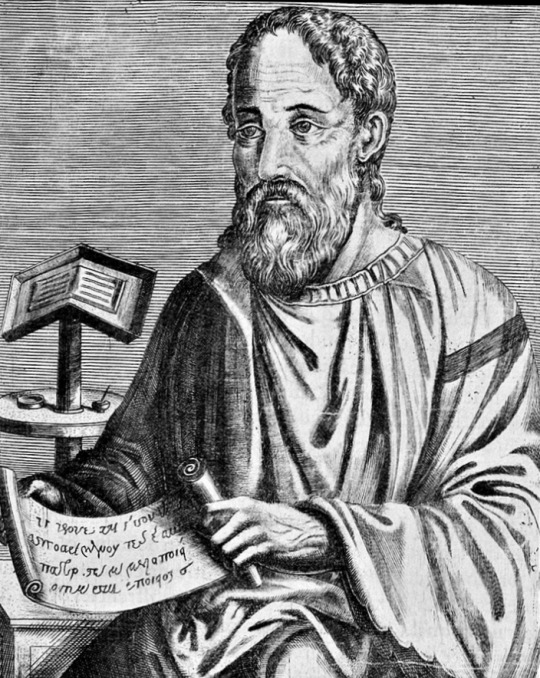
Church History, Eusebius, 4th century
Eusebius had access to one of the largest sources of knowledge in the ancient world: Library of Caesarea.
This allowed him to piece together this contentious history of the church through letters, martyrdom accounts, and lists of bishops.
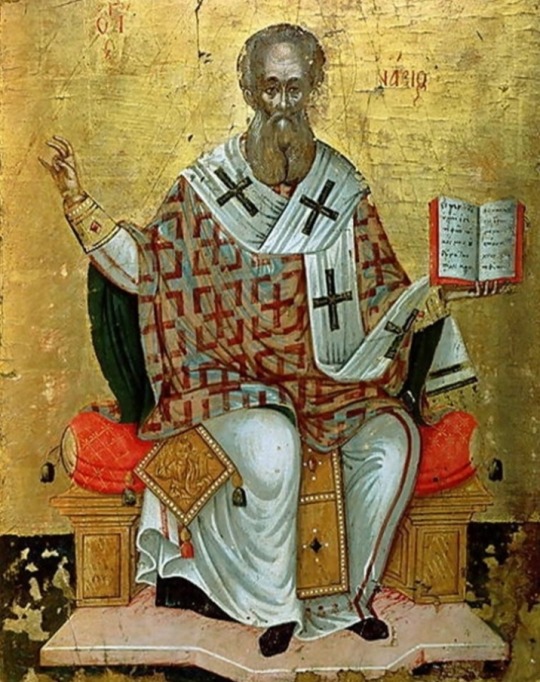
On the Incarnation, Athanasius, 4th century
C.S. Lewis said of it:
“When I first opened On the Incarnation, I soon discovered…that I was reading a masterpiece.“
Here, Athanasius presents the incarnation as a solution to man's fallen nature, or what he calls the “divine dilemma."
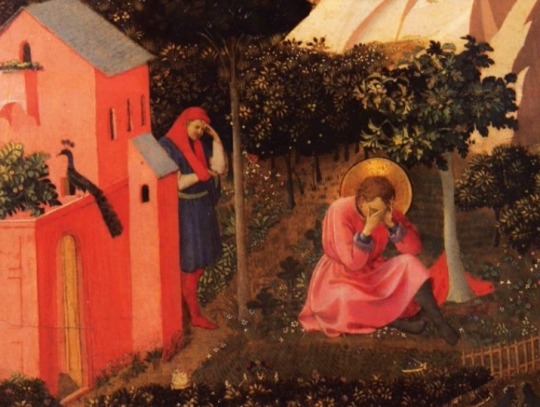
Confessions, Augustine, 5th century
Augustine's masterpiece is an autobiography where he ponders his troubled youth and eventual conversion to Christianity as he traversed the Roman empire.
It’s a story of the struggle against sin and the metanoia of a future saint.

The City of God, Augustine, 5th century
An intellectual tour de force, The City of God depicts the ultimate struggle of the human condition — a war where all must make a choice between the “earthly city” and the “city of God.”

Sayings of the Desert Fathers, various authors, 5th century
Ancient wisdom from desert hermits.
It’s a collection of wisdom stories and maxims from the desert fathers, who were some of the earliest hermits and ascetics.
Early monks looked to these stories for spiritual guidance.
#Early Christians#Bible#books#The Didache#The Shepherd of Hermas#St. Iranaeus#canonical scripture#Church History#Eusebius#Library of Caesarea#On the Incarnation#Athanasius#C.S. Lewis#Confessions#Augustine#The City of God#Sayings of the Desert Fathers#desert hermits#ancient wisdom#desert fathers
2 notes
·
View notes
Text

A man after God's own heart
4 notes
·
View notes
Text

#humans are a fun species#good for them#master splinter would approve#for the city#humans will always make gods out of the absurd
85K notes
·
View notes
Text
All for the Glory of God
1 Now the leaders of the people lived in Jerusalem. And the rest of the people cast lots to bring one out of ten to live in Jerusalem the holy city, while nine out of ten remained in the other towns. 2 And the people blessed all the men who willingly offered to live in Jerusalem. 3 These are the chiefs of the province who lived in Jerusalem; but in the towns of Judah everyone lived on his…
#city on a hill#God#holiness#Israel#Jerusalem#Judah#judgment#Nehemiah#Nehemiah 11#obedience#praise#rebuild the walls#repopulation#restoration#the city of God#the glory of God#the house of God#Zion
0 notes
Text
Just came home from watching Cidade de Deus / The city of God.... i am not well
0 notes
Text
sometimes I randomly think about the time a girl posted in this girls only Facebook group I’m in telling everyone how she broke up with her boyfriend and he lied saying that he lost the spare key she gave him, only to then break into her apartment when she wasn’t home and steal the cat they’d adopted while they were together, but then he denied having done this and she didn’t really have proof that he took the cat since he wouldn’t let her come into his place and look for it. And then another girl saw this post and knew her ex-boyfriend, and she was like “girl. I used to hook up with your mans back in xxxx and I still have his number. If you want, I’ll hit him up and get him to invite me back to his place and see if your cat’s there.” And the OP was like “bet.”
So this woman hit up homie dog, asked him out for drinks, went home with him, slept with him, and then woke up in the middle of the night and TOOK THE CAT. Like she had only said that she would confirm if the cat was there but then she took it upon herself to steal this woman’s cat back. Like she full on Trojan horsed this man and then hit up homegirl like “I got the goods. Where you wanna meet.” And then the two of them posted a photo of them together with the cat to the group.
And I just think women supporting women is so beautiful.
#the best part of all is that I also knew the ex boyfriend because he worked at this place my friend was the manager of#and I texted my friend like ‘yo have you heard about this cat situation’#and she was like ‘I swear to god if one more person asks me about this fucking cat’#it was the drama of the century#the whole city was up in arms over this cat
116K notes
·
View notes
Text
why do i love ricky matsui? well, a candy dragon is about to explode out of a well cuz a little girl currently in the form of a bald bear is plugging up the entrance, and this is his genuine reaction:

#god he's so so good#i've missed him so so much#d20#dimension 20#ricky matsui#time quangle#the unsleeping city#tuc
3K notes
·
View notes
Text
“[…] pero la paz es un bien incierto, porque desconocemos los corazones de aquellos con quienes queremos tenerla y aunque los conozcamos hoy, no sabemos qué será mañana.”
San Agustín, La Ciudad de Dios, Cap. 7 Las limitaciones de la vida social, p.218
1 note
·
View note
Text

for true story
now available as a print!
#sonic the hedgehog#shadow the hedgehog#oh my god i finally finished this piece#i started this almost a month ago but kept get waylaid by other work#very pleased with how this one came out hehe#shout out devin elle kurtz for her city brushes#they made the background so much easier#sonic adventure 2#sa2#sonic x shadow generations
2K notes
·
View notes
Text



Not enough signs about how much I'd like to stick my hands between the moving parts of a machine, so I did it myself
#please let me crawl into an industrial grinder i want to be eaten by a machine#eroticism of the machine#these are about an oc yeah city sized biomechanical god would turn you into meat waffles#and id be ok with that
8K notes
·
View notes
Text

paris of troy! during those years he was a shepherd.
I was reading cartledge's book on thebes and every now and then the spartan focuses wrt to the pantheon of gods comes up. sparta has nothing to do with this except for where it does, but apollo karneios was discussed and that got my attention, which circled back to paris, and then I started thinking about the paris + apollo link
I also started thinking about narrative rejections bc paris has a funky absence in the iliad that's giving a kind of...a vibe. your parents shouldn't have had you, the story doesn't want you around, but oh boy are you there anyway, manifested into existence. no matter what, doom must manifest in flesh form. it's a narrative necessity, the actual incident (the judgement) is secondary.

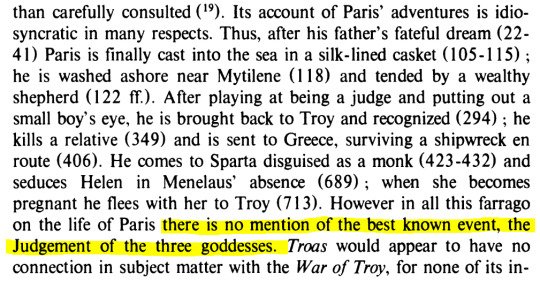
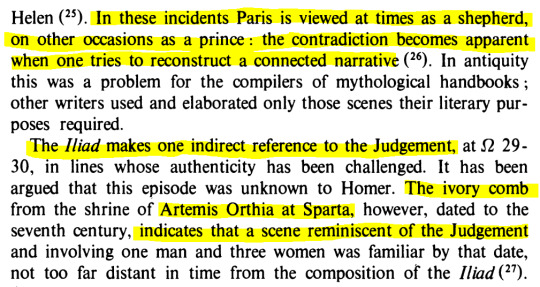

The Judgement of Paris in Later Byzantine Literature, E. M. Jeffreys
weird! love it! almost (but not quite) reminds me of troilos' murder at achilles' hands lurking in the guts of the iliad. it's there, even when it's not. more importantly tho: sheep. I miss working on a farm with sheep and goats and cows and--
#a lot of the early stuff with paris reminds me of geta of roman emperor fame tbh like goddamn what the hell is going ON there#anyway. last year i wrote the script for a comic about paris and what it means to get body hijacked by a plot older than you#very oedipus to be absolutely damned by all forces before you were born. which also means i can make this about thebes. and if#i can make it about thebes then it's ALSO about rome bc rome and thebes are sister cities#christ i'd love to find the time to actually draw it#ancient greece tag#<< eventually going to update the previous greece tag to all fit under this one. eventually. some day#god. anyway. 'readers are given no reason for his vehement insistence on leaving troy' aughGHGHHHHHHHH#drawing tag
1K notes
·
View notes
Text
SAINT OF THE DAY (August 28)

Today, August 28, the Church honors St. Augustine.
St. Augustine was born at the town of Thagaste (now Souk-Ahras in modern day Algeria) on 13 November 354.
He became one the most significant and influential thinkers in the history of the Catholic Church. His teachings were the foundation of Christian doctrine for a millennium.
The story of his life, up until his conversion, is written in the autobiographical Confessions, the most intimate and well-known glimpse into an individual's soul ever written, as well as a fascinating philosophical, theological, mystical, poetic, and literary work.
Augustine, though being brought up in early childhood as a Christian, lived a dissolute life of revelry and sin.
He soon drifted away from the Church — thinking that he wasn't necessarily leaving Christ, of whose name he acknowledges:
"I kept it in the recesses of my heart; and all that presented itself to me without that Divine name, though it might be elegant, well written, and even replete with truth, did not altogether carry me away" (Confessions, I, iv).
He went to study in Carthage and became well-known in the city for his brilliant mind and rhetorical skills. He sought a career as an orator or lawyer.
However, he also discovered and fell in love with philosophy at the age of 19, a love he pursued with great vehemence.
He was attracted to Manichaeanism at this time, after its devotees had promised him that they had scientific answers to the mystery of nature, could disprove the Scriptures, and could explain the problem of evil.
Augustine became a follower for nine years, learning all there was to learn in it before rejecting it as incoherent and fraudulent.
He went to Rome and then Milan in 386 where he met Saint Ambrose, the bishop and Doctor of the Church, whose sermons inspired him to look for the truth he had always sought in the faith he had rejected.
He received baptism and soon after, his mother, Saint Monica, died with the knowledge that all she had hoped for in this world had been fulfilled.
He returned to Africa, to his hometown of Tagaste, "having now cast off from himself the cares of the world, he lived for God with those who accompanied him, in fasting, prayers, and good works, meditating on the law of the Lord by day and by night."
On a visit to Hippo, he was proclaimed priest and then bishop against his will.
He later accepted it as the will of God and spent the rest of his life as the pastor of the North African town, where he spent much time refuting the writings of heretics.
Augustine also wrote 'The City of God' against the pagans who charged that the fall of the Roman empire, which was taking place at the hands of the Vandals, was due to the spread of Christianity.
On 28 August 430, as Hippo was under siege by the Vandals, Augustine died at the age of 76.
His legacy continues to deeply shape the face of the Church to this day.
4 notes
·
View notes
Text


they have an exam in two days but they keep making out about it
#just like me fr tbh why am i not with my books#oh well#my sister thinks i should caption this hashtag murderous envy#because it’s all i convey when talking about it#imagine if housing prices in my city were humane#god#farcille#farcille fanart#marcille donato#falin touden#dungeon meshi#dunmeshi#falin x marcille#delicious in dungeon#modern au#college roommates au#art tag
4K notes
·
View notes
Note
lol I hope you weren’t under the impression that the dress was hiding how ill fitting your bra was….

i’m not really worried abt that bc imagine these in that dress. if you’re at my height or taller than me: YOURE WELCOME
#the lil dots are bc i’ve been sweating like crazy doing stuff outside and ughhh#i need to exfoliate#y’all i got a new shampoo bar tho and it’s SO GOOD my hair is so much softer#i’ve been having issues finding a good shampoo bc i went from soft city water m#to extremely hard water#and it turns out all those minerals dry my hair out which. i’ve never dealt with before haha#anyways god bless my great aunt and her impulse buying of shampoo bc she just gives me her extras it’s awesome m#talk#ask
2K notes
·
View notes